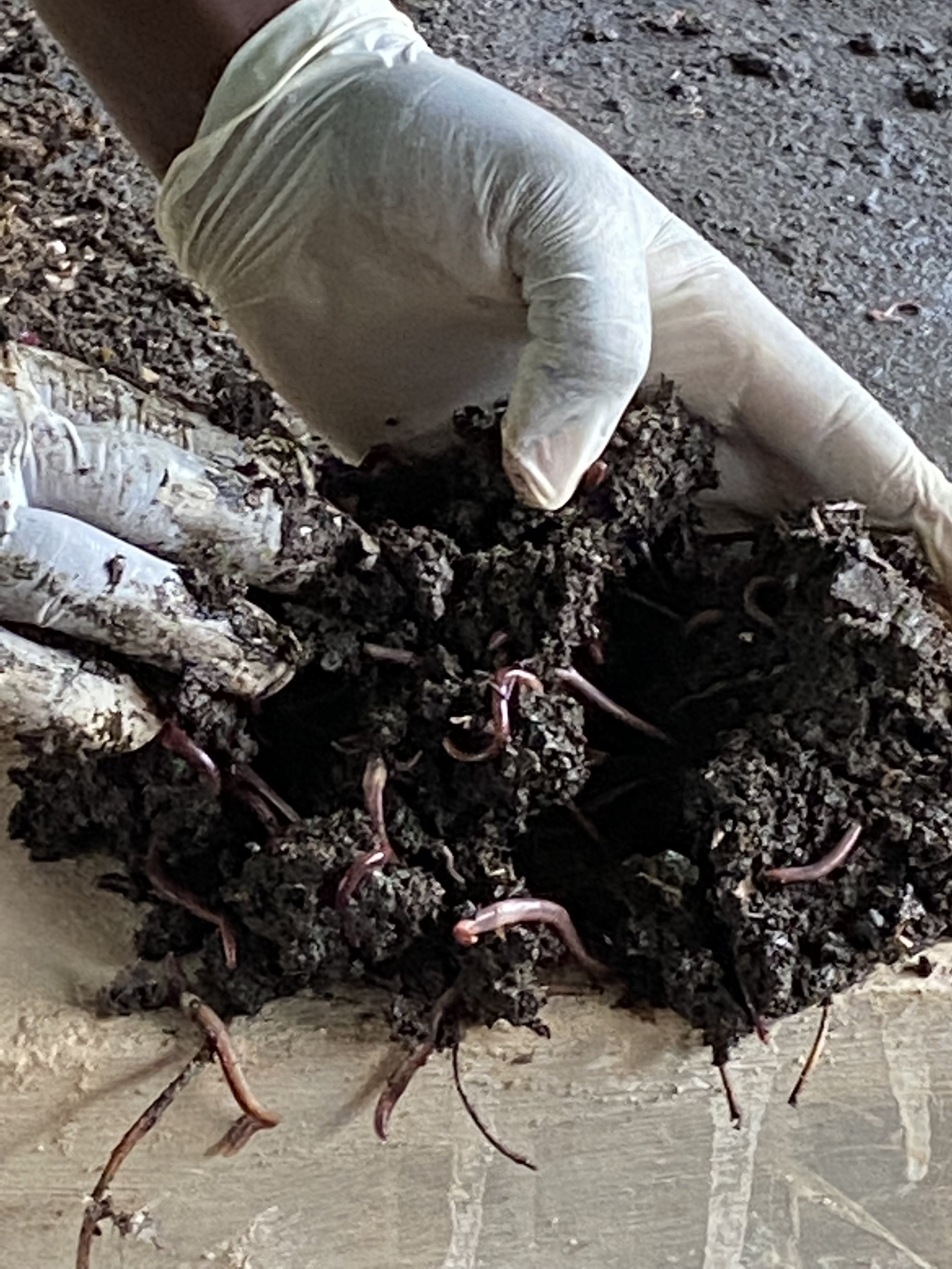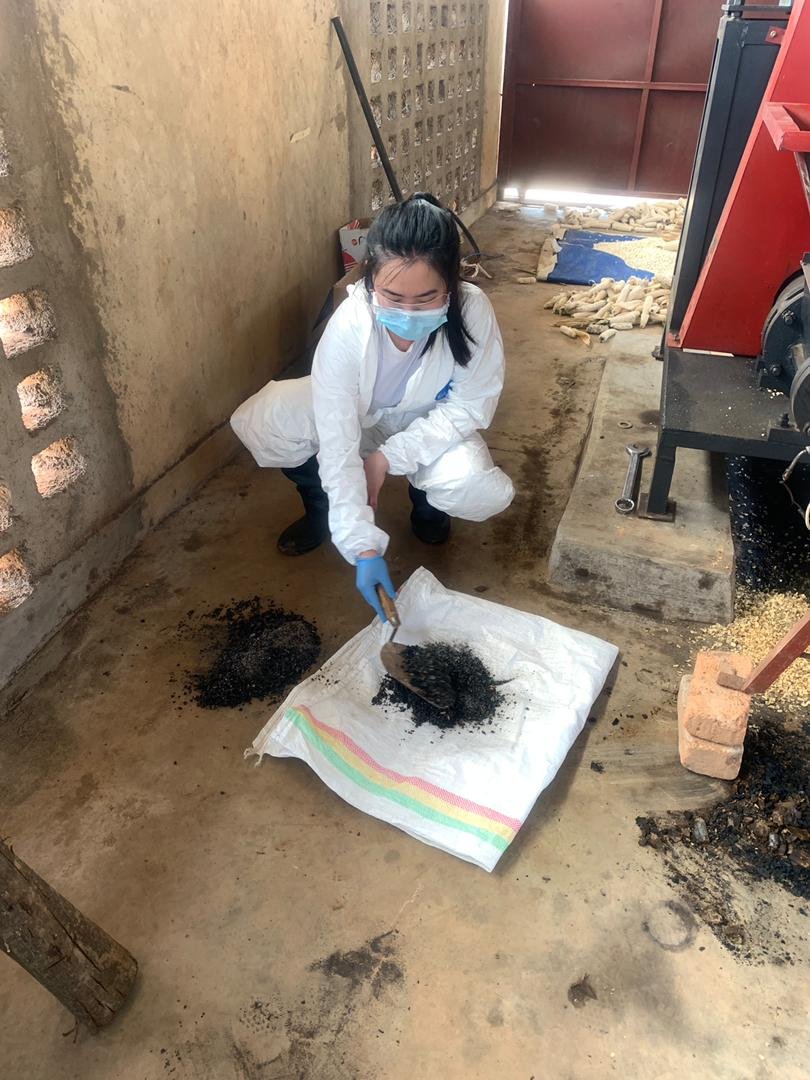News
The Great Exhibition Road Festival 2023
06.2023
Dr Laure Sioné and MEng students showcased the group's research on sanitation at the Great Exhibition Road Festival 2023, which brings together iconic museums, and research and culture organisations, including Imperial College London, the Royal Albert Hall, Science Museum, V&A, and the Natural History Museum.
The stall displayed pit emptying technologies including a novel manual pump and fishing tool, which the public could try for themselves on simulated sludge while learning about the current risks of pit emptying and the challenges involved in developing new technologies.
MEng student Nadia Angelica pictured below, mixing simulated sludge (left) in preparation for the public to try out the pump with Dr Laure Sioné (right).
Tiger worms and Tiger Worm Toilets were the show of the stall, teaching the public about this simple yet effective technology in reducing pit fill rate, burden of disease, odours and flies in pits.
MEng student Elsa Germain pictured below, showing Tiger Worms to children while parents listen in.
Water Innovation and Circularity Conference (WICC) 2023
06.2023
Ms Maria Koulouri presented at the Water Innovation & Circularity Conference 2023, on phosphorus and nitrogen recovery from stored human urine via precipitation and adsorption onto faecal-derived biochars.
Seminar presentation by Professor Templeton
25.05.2023
On Thursday 25 May 2023 Professor Templeton gave an invited seminar presentation at the Institute for Energy and Environmental Flows at the University of Cambridge titled ‘Energy and Environmental Flows in Sanitation’.
New Publication: Journal of Environmental Management
The Journal of Environmental Management has published a paper on Source separation of human excreta: effect on resource recovery via pyrolysis. This study aimed to establish a quantifiable relationship between human excreta source separation and resource recovery via pyrolysis.
The effects of source separation of faeces and urine on biochar quality were investigated for different pyrolysis temperatures and this information was used to assess energy and nutrient recovery.
Findings could support the design of circular faecal sludge management systems, linking resource recovery objectives to source conditions, and vice-versa.
Authors: Maria E. Koulouri, Michael R. Templeton, Geoffrey D. Fowler.
Imperial team visits partners in Rwanda
01.03.2023
In early March 2023 Professor Michael Templeton, the Oxfam and Water For People / Royal Academy of Engineering Research Chair in Global Sanitation Technology, and his students travelled to Kigali, Rwanda, also known as the Land of a Thousand Hills due to its hilly terrain. They were there to conduct research with the Water For People in-country water, sanitation and hygiene (WASH) team. Professor Templeton also met with many stakeholders involved in sanitation in Rwanda, including the Ministry of Infrastructure (pictured below right), Unicef, and WaterAid and Kigali-based researchers at the University of Rwanda and Carnegie Mellon University-Africa.
Pictured left: the Imperial College London team left to right: Maria Koulouri (PhD student), Nadia Angelica (MEng student 2023), Elsa Germain (MEng student 2023), Prof Michael Templeton, Benjamin Okoko (MEng student 2023) with independent sanitation consultant Jeff Broome (centre right) at the Water for People Kigali office to meet Country Director Eugene Dusingizumuremyi (center left).
Over the next few months, final year MEng students will be researching engineering challenges at different points along the sanitation service chain, using case studies from Rwanda.
Elsa visited the Rulindo Vermifiltration Plant with Water for People staff and the Rulindo Plant workers, to investigate worm-based technology as a potential low-cost, modular community-scale faecal sludge treatment option. The Rulindo Vermifiltration Plant makes the most of the hilly terrain and gravity-feeds faecal waste to worm bio-filters. The worms thrive on the faecal sludge and convert it into compost.
Nadia, accompanied by PhD student Maria, visited the Nyamagabe Decentralized Faecal Sludge Treatment Plant to investigate the performance of pyrolysis of faecal sludge under different operating conditions (left and centre). Benjamin is testing out prototypes to mix, ‘fish’ and pump out solids from pit latrines on full latrines in Kigali, with the aim of improving the designs and making latrine emptying easier and quicker (right).
The 21st African Water Association International Congress & Exhibition
19.02.2023
PhD student Maria Koulouri presented her findings on the effect of wood biomass and human faeces co-pyrolysis on carbon sequestration at the Congress in Abidjan.
Her presentation included insights on the calculation of carbon retention and stability in biochars produced at different blending ratios and different temperatures.
Wider implications of this work are relevant to sustainability decision-making in sanitation management, encouraging carbon calculations and climate change mitigation considerations in the design of thermal faecal sludge treatment systems.
World Toilet Day 2022
19.11.2022
World Toilet Day is an official United Nations international observance day of the global sanitation crisis. What did you see or do on World Toilet Day that raised awareness of people living without access to safely managed sanitation? Let us know!
9th International Conference on Sustainable Solid Waste Management
06.2022
Congratulations to Ms Maria Koulouri for winning an award for the best poster presentation at the 9th International Conference on Sustainable Solid Waste Management in Corfu 2022. The poster presented her work on source-separation of human excreta as a driver for optimised resource recovery via pyrolysis.
New publication - The Source Magazine, IWA
26.05.2022
The Source Magazine has published a piece on innovation titled “Shitovation: solving sanitation challenges where sewers don’t exist”.
International Water Association (IWA) Publishing focuses on issues surrounding water, aiming to help improve global health and well-being.















